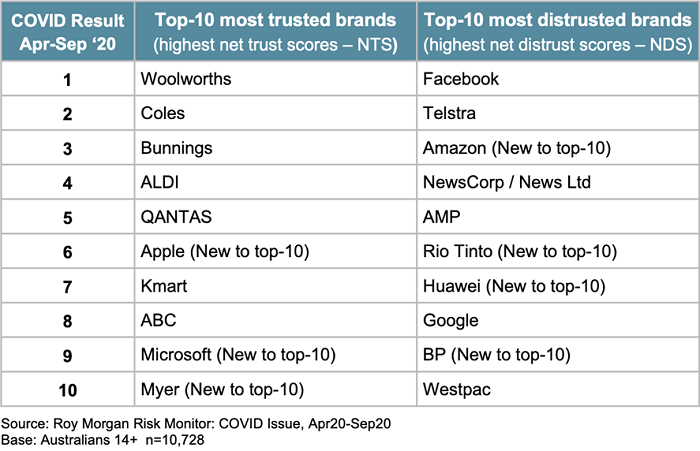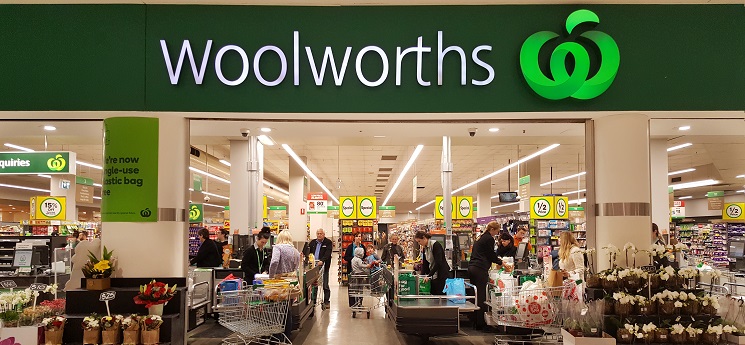Trust is everything. Every time we get behind the wheel, we trust other road-users to obey the rules; when we go to the GP, we trust him or her to give us the best treatment possible. Trust allows us to live a less stressed life. And in recent years, it was trust that was a major casualty of the financial services and aged care royal commissions.
Roy Morgan data scientists have analysed nominations from more than 10,000 Australians – collected in 2020 – to identify the nation’s 10 most trusted brands, and the 10 we most distrust.
As the pandemic raged across Australia, supermarket shopping became front page news – queues, empty shelves, shoppers attacking other shoppers, toilet roll rage. But then limits were placed on key items and measures were put in place to allow us all to shop safely. Supermarkets rose to the occasion.
Perhaps that’s why they snatched top place in the most trusted brands category.
The Roy Morgan Risk Report: COVID Issue reveals that the winners’ list is dominated by supermarkets.
For the first time, the two major supermarket brands, Woolworths and Coles, took top spots on the list of most trusted brands in the country, pushing Bunnings and Aldi down to third and fourth.
Roy Morgan CEO Michele Levine says Coles continued its rapid rise up the trust league ladder.
“In May last year, we reported that Coles was the fastest mover, lifting three rankings. During the depths of COVID, our data collected between April and September 2020 reveals that Coles jumped another two rankings to be neck and neck with Woolworths in the top two positions.”
Given that we became extra reliant on technology during COVID lockdowns, it is also perhaps unsurprising that for the first time Apple and Microsoft entered the top 10 most trusted list.
In the top 10, after Woolworths, Coles, Bunnings and Aldi are: Qantas, Apple (new to the top 10), Kmart, ABC, Microsoft (new) and Myer (new).
For the first time there were no banks or financial institutions in the top 10 trusted list.
Turning to the brands that we least trust, and there were four newcomers to the top 10.
Rio Tinto’s decision to destroy the 46,000-year-old Juukan Gorge Indigenous heritage site saw it leap into the top 10.
But taking the gong was Facebook, with chief executive Mark Zuckerberg admitting the company had trust issues as he was announcing details of its cryptocurrency project, ranking it as more distrusted than Huawei and Google.
The top 10 least trusted were: Facebook, Telstra, Amazon, News Corp, AMP, Rio Tinto, Huawei, Google, BP and Westpac.

NAB was a big improver on the distrust ladder, dropping out of the top 10.
What does this data tell us about 2021? Ms Levine says: “Distrust remains the number one risk factor for the nation’s companies because it is the toxic element in brand equity. Trust is a brand asset while distrust is a brand liability.
“It’s clear, then, that distrust should be on the risk register of every publicly listed company in Australia. Why isn’t it? Because until Roy Morgan’s data scientists identified the toxic nature of distrust, no-one was measuring it.”
The Roy Morgan Risk Monitor surveys about 2000 Australians every month to measure levels of trust and distrust in more than 800 brands across 25 industry sectors. Respondents are asked which brands and companies they trust, and why, and which brand and companies they distrust, and why.
Do you agree with the survey results? Which are your most trusted and distrusted brands?
If you enjoy our content, don’t keep it to yourself. Share our free eNews with your friends and encourage them to sign up.
Related articles:
https://www.yourlifechoices.com.au/health/covid19/tga-approves-pfizer-vaccine-as-safe-in-older-adults-despite-deaths
https://www.yourlifechoices.com.au/health/news-health/science-uncovers-foods-that-fight-ageing-and-improve-brain-health
https://www.yourlifechoices.com.au/government/pension/government-urged-to-slash-interest-rate-on-retiree-scheme

